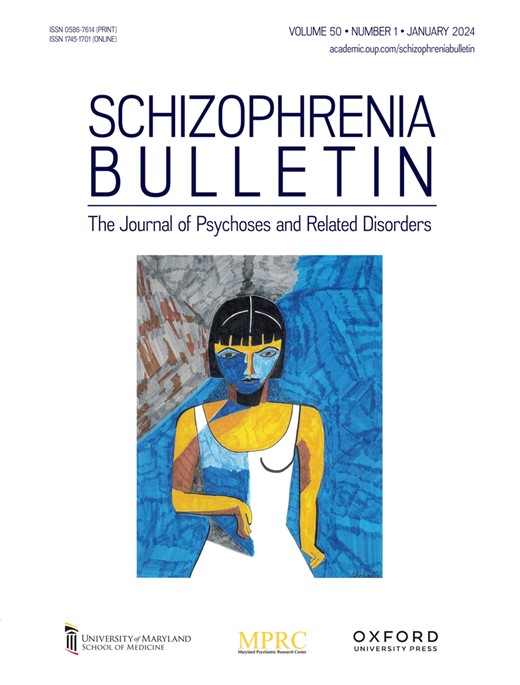孟德尔随机化研究揭示血液代谢物与精神疾病之间的因果关系
IF 4.8
1区 医学
Q1 PSYCHIATRY
引用次数: 0
摘要
背景与假设代谢失调在精神疾病中被广泛观察到。然而,代谢物与精神疾病之间的因果关系在很大程度上仍然未知。在这里,我们进行了双向孟德尔随机化(MR)分析,系统地研究了8种精神疾病(包括注意缺陷多动障碍(ADHD)、神经性厌食症(AN)、焦虑、双相情感障碍(BIP)、抑郁、创伤后应激障碍(PTSD)、失眠和精神分裂症(SCZ))与1139种血液代谢物(包括823种代谢物水平和316种代谢物比率)之间的因果关系。在正向磁共振中,我们分别鉴定出34、21、56和1种代谢物与BIP、SCZ、抑郁症和PTSD相关。值得注意的是,几种代谢物与多种精神疾病的风险有关。N2、N2-二甲基鸟苷、1,2-二棕榈酰-gpc(16:0/16:0)、磷脂酰胆碱酰-烷基C38:4与SCZ和BIP风险呈负相关。在反向MR分析中,我们探索了精神疾病对代谢物的因果关系,发现血液代谢物也受到精神疾病的影响。例如,抑郁症显著影响21代谢物水平,包括与21-羟基孕烯醇酮二磺酸呈正相关,与类胡萝卜素负相关。结论我们的发现不仅揭示了代谢物与精神疾病之间的因果关系,而且为预防和治疗这些精神疾病提供了潜在的治疗靶点。本文章由计算机程序翻译,如有差异,请以英文原文为准。
Mendelian-Randomization Study Reveals Causal Relationships Between Blood Metabolites and Psychiatric Disorders
Background and Hypothesis Metabolic dysregulation has been widely observed in psychiatric disorders. However, the causal relationships between metabolites and psychiatric disorders remain largely unknown. Study Design Here, we conducted bidirectional Mendelian randomization (MR) analyses to systematically investigate causal relationships between 8 psychiatric disorders (including attention deficit hyperactivity disorder (ADHD), anorexia nervosa (AN), anxiety, bipolar disorder (BIP), depression, posttraumatic stress disorder (PTSD), insomnia, and schizophrenia (SCZ)) and 1139 blood metabolites (including 823 metabolite levels and 316 metabolite ratios). Study Results In forward MR, we identified 34, 21, 56, and 1 metabolites that are associated with BIP, SCZ, depression, and PTSD, respectively. Notably, several metabolites are associated with the risk of multiple psychiatric disorders. For instance, N2,N2-dimethylguanosine, 1,2-dipalmitoyl-gpc (16:0/16:0), and phosphatidylcholine acyl-alkyl C38:4 were negatively associated with the risk of SCZ and BIP. In reverse MR analyses, we explored the causal effects of psychiatric disorders on metabolites, and found that blood metabolites are also influenced by psychiatric disorders. For example, depression significantly affected 21 metabolite levels, including positively associated with 21-hydroxypregnenolone disulfate, and negatively associated with carotenoid. Conclusions Our findings not only uncover the causal relationships between metabolites and psychiatric disorders, but also provide potential therapeutic targets for the prevention and treatment of these psychiatric disorders.
求助全文
通过发布文献求助,成功后即可免费获取论文全文。
去求助
来源期刊

Schizophrenia Bulletin
医学-精神病学
CiteScore
11.40
自引率
6.10%
发文量
163
审稿时长
4-8 weeks
期刊介绍:
Schizophrenia Bulletin seeks to review recent developments and empirically based hypotheses regarding the etiology and treatment of schizophrenia. We view the field as broad and deep, and will publish new knowledge ranging from the molecular basis to social and cultural factors. We will give new emphasis to translational reports which simultaneously highlight basic neurobiological mechanisms and clinical manifestations. Some of the Bulletin content is invited as special features or manuscripts organized as a theme by special guest editors. Most pages of the Bulletin are devoted to unsolicited manuscripts of high quality that report original data or where we can provide a special venue for a major study or workshop report. Supplement issues are sometimes provided for manuscripts reporting from a recent conference.
 求助内容:
求助内容: 应助结果提醒方式:
应助结果提醒方式:


